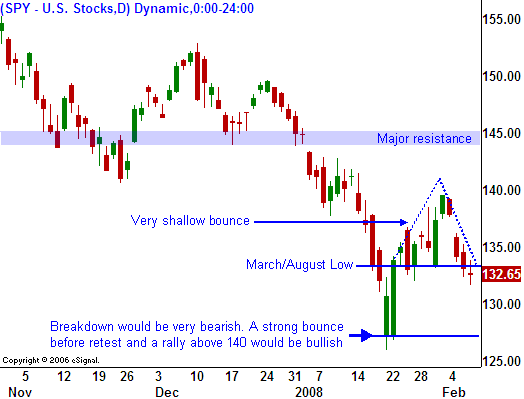The Market Needs A Catalyst – Option Traders Watch Support.
Overnight, European stock markets followed our lead and they were down about 2%. The ECB maintained its hawkish policy and it reiterated inflationary concerns. On the other hand, the Bank of England lowered interest rates a quarter point to 5.25% in a widely expected move. Deutsche Bank avoided new sub-prime related write-downs, but profit slipped 48% from last year. All told, that was a good sign.
If the sub-prime write downs start easing, financial stocks can start the healing process. Weakness in the housing market has affected consumers and this morning, retailers reported dismal results. Cisco earnings were decent, but they forecasted 10% earnings growth in the third quarter. Analysts had expected 15% growth and they nailed the stock after the number. This has generated selling pressure for tech stocks.
Yesterday's early rally reversed and the bears pushed prices down right into the close. In the absence of a catalyst, that pattern will continue. The Fed no sooner lowered interest rates by 1.25% in an eight day period and the market was looking for the next cut. We are not going to see any market rally related to future rate cuts. The rate cuts are artificially supporting the market at this juncture. The government needs to shore up the mortgage insurers. If they do this, it will send the strongest possible message to the market.
Fear of the unknown is the current catalyst. Investors don't know how aggressive financial institutions have been in writing down their assets. Poor transparency makes investors worry that the problem could spread quickly. If the government took the money that it allocated to the tax rebate program and used it to back the mortgage insurers, the market would be trading much higher.
Earnings have actually been pretty good. That performance has been masked by financial stocks. Last quarter, financial stocks lost $25 billion. That's the same amount that they made in the same quarter a year earlier. In essence, they gave back what they made. When you put it in that light, things don't seem quite so dire. If you strip out financial stocks from the S&P 500, companies have been reporting and 11% earnings growth rate.
When your home and your financial assets are slipping in value, you start to get worried. People can deal with a recession, but they can't stomach the thought of a financial collapse.
In the meantime, the Fed and the government keep printing money instead of attacking the source of the problem. This has pushed the dollar to 30-year lows.
Earnings were good, but they did not generate a spark. Interest rates are low. If the ECB changed their rhetoric, that might have helped, but they are avoiding the dark alley we have already gone down. The rate cuts are not helping and they won’t for another 6-12 months. I believe there are two catalysts left; a decrease in the sub-prime write-downs by banks or a mortgage insurance program from the government.
Here is my option trading perspective. The market had a very weak bounce off of a capitulation low and support at SPY 134 has been breached. If the market easily tests and breaks below the SPY 125 support level, bearish times lie ahead. If the market gradually compresses down to the SPY 125 level and rockets higher before it has reached, the lows for at least the next few months are in. Ideally, that bounce would take us above SPY 140. This is a critical juncture and only time will tell what happens.
We need help from one of the sources above to prevent the market from breaking down.


Daily Bulletin Continues...

